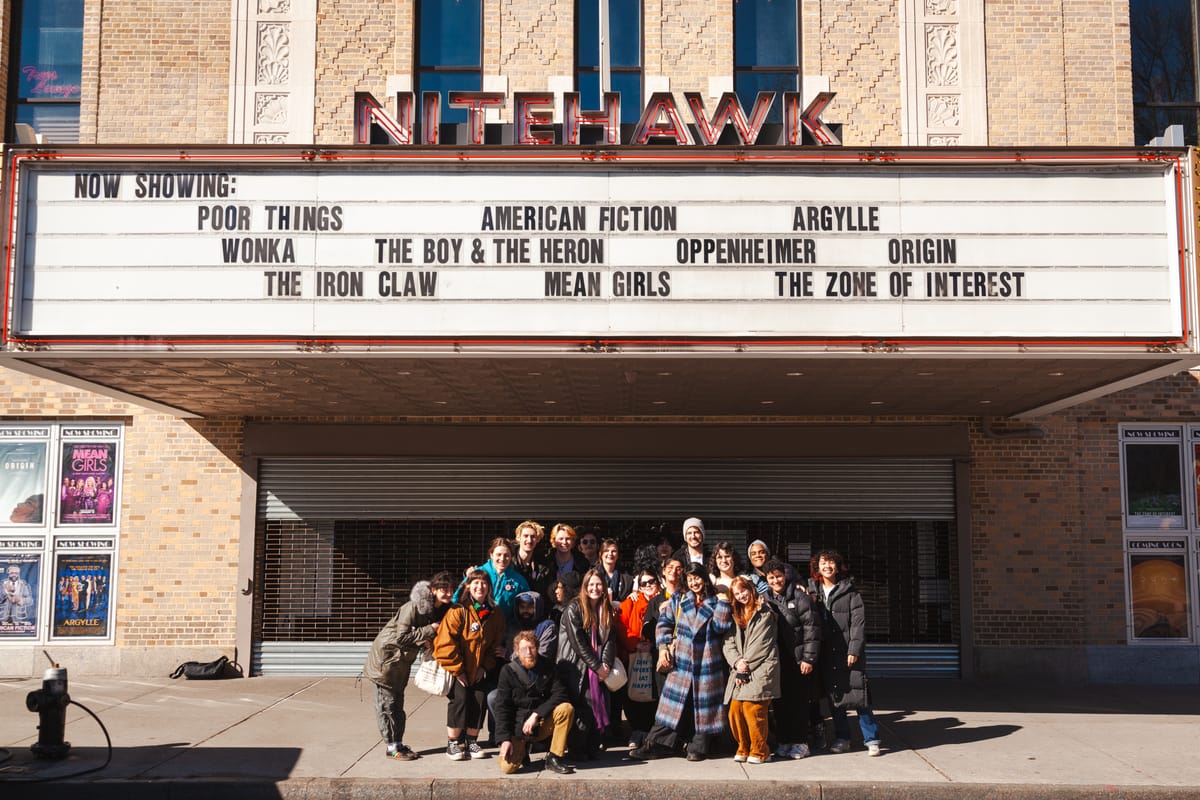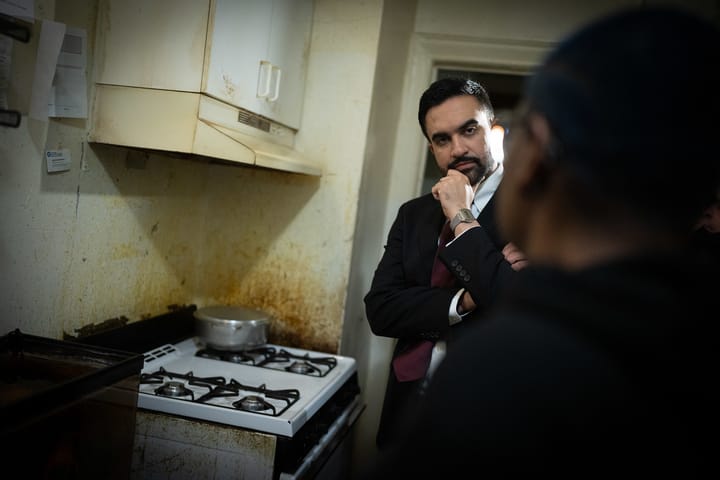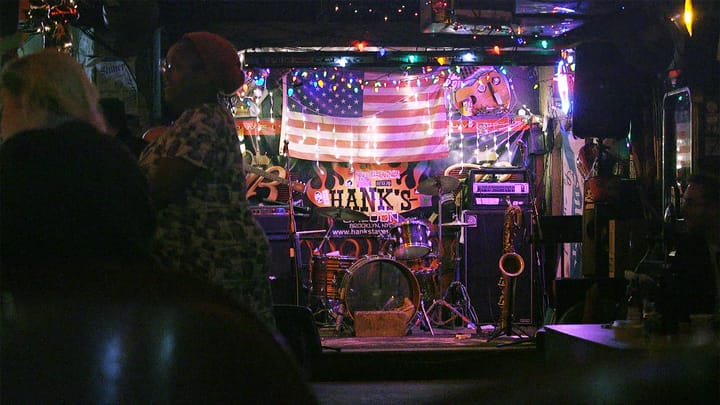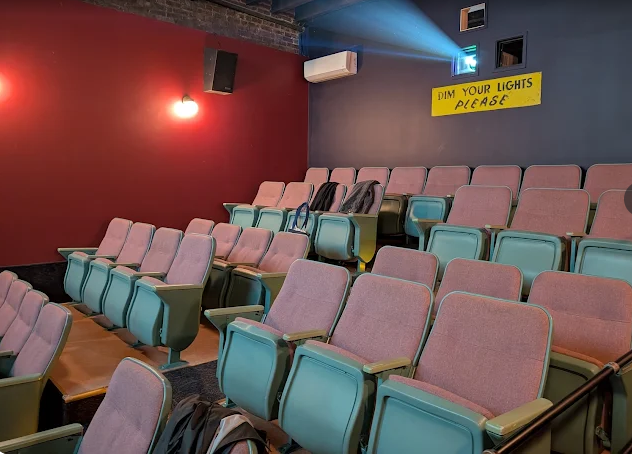On solidarity and serving in the dark: A Q&A with the newly formed Nitehawk Union
"Don’t be afraid to turn complaining with your coworkers into something real and actionable.”

New York City’s service industry union wave has officially made its way to our movie houses. Workers at Nitehawk Cinema’s Prospect Park location announced their unionization on Tuesday, citing “unsafe working conditions” and "dangerously overworked” staff.
At the height of the summer’s Barbenheimer frenzy, work in an under-staffed kitchen, “Was horrendous,” said Malik Smith, a line cook and member of Nitehawk’s organizing committee. “They expected us to produce food for upwards of 2,000 people a night again and again and again, night after night. It was hell, we were all burnt out.”
The Nitehawk union announcement comes just months after workers at Brooklyn’s Alamo Drafthouse location unionized over the summer, followed shortly thereafter by their colleagues at the chain’s Lower Manhattan location. (Workers at Film Forum and BAM are unionized as well.)
Unsurprisingly, staff at two of the city’s most prominent dine-in theater chains have compared notes, and are now organized with the same union, UAW local 2179.
“Alamo has been super helpful,” said Alana Moskowitz, a server and member of Nitehawk Cinema Workers Union organizing committee. “They’ve shared resources, they’ve protested in the streets, they’re wonderful people to work with.”
With business models that are “nearly identical” between Nitehawk and Alamo, Catherine Coradini, also a server and organizing committee member at Nitehawk, said: “Their sharing of information has been incredibly helpful to us in our campaign.”
On the heels of their big announcement, we caught up with members of Nitehawk’s organizing committee to discuss balancing trays in the dark, the long shadow of Barbenheimer, tips on organizing in the service industry, and … just tips in general:
First up: why did they decide to unionize?
Like just about every shop that decides to go union, the motivating factors were a combination of bad working conditions and not enough money. (This is as good a place as any to note that Nitehawk management didn’t respond to a request for comment for this story.)
And of course, there was also Barbenheimer.
During the rush of Barbie and Oppenheimer screenings over the summer, the grueling pace of screenings brought existing issues to a head.
“We’d been having conversations [about unionizing] leading up to this, but that was the point where things got very serious for us,” said Ben Sepinuck, another organizing committee member.
The theater wound up being one of the highest performing in the entire country during the Barbenheimer frenzy, according to an email from Warner Brothers shared by Nitehawk management, but questions about bonuses were laughed off, according to committee members.
This all came on top of existing stressors like low pay and inadequate health benefits, alongside the particularities of serving food and drinks in dark theaters — in a 100-year-old building. (As such, the union’s current demands center around higher wages, a scheduling system that allows time for rest and recovery, and improved safety conditions in the building itself.)

Staffers cited the physical toll of clambering up and down the building’s endless flights of stairs with trays of food and drink in a building even managers describe as “labyrinthian;” climate control issues such as wet, slippery floors and broken air conditioning; and issues specific to serving customers in a darkened theater.
“Guests will reach out and touch servers to try to get their attention, which is something management hasn’t been willing to address,” Moskowitz said.
All of this, for wages low enough that committee members say nearly every person on staff currently works a second job.
Sepinuck said: “Sometimes when I’m on my way up the stairs, I’m thinking about how there’s more money in sales [for the theater] on the tray I’m carrying than what I’m going to make today.”
How did the bosses react?
The union formally went to management this week, and while the bosses declined to voluntarily recognize the union, so far, nothing has gotten ugly.
“The response was overall pretty receptive,” Moskowitz said. “They definitely took time to consider our letter.”
A follow-up email from management’s lawyer “wasn’t aggressive, it was pretty boilerplate,” Moskowitz added. “It’s not a giant union-busting firm or anything. We’re looking forward to overall positive conversations.”
Why is the union only representing Nitehawk’s Prospect Park location, and not the Williamsburg location?
This one is mainly a question of logistics — other than company wide upper management, Nitehawk’s Prospect Park and Williamsburg locations are working with different staff and different management teams.
“The buildings themselves are so different, and despite sharing the same model and the same menu and [owners], there are a lot of differences in the day to day,” Sepinuck said.
That said, Prospect Park staffers are in touch with their Williamsburg counterparts.
“They’re not unionizing at this time, but that being said, the same way Alamo going public really inspired us, we hope it inspires more efforts industry wide,” Moskowitz said.
How did they pull it off — and how can other service workers do the same?
Just about any union drive starts with good old-fashioned complaining and commiserating among coworkers. Following a frustrating post-Barbenheimer all-staff meeting, “We had our first union meeting,” Moskowitz said. “I’d spoken up on this and started whispering to people to come to the park, to start talking organizing.”
Workers then reached out to the Barboncino union, and the DSA’s Emergency Workplace Organizing Committee (EWOC), which helps pair union-curious workers with potential organizers. They also went straight to the source, and asked Alamo.
“I went up to the Alamo box office and said, ‘We were also victimized by Barbenheimer,’ and they put us in touch with their UAW organizer,” Moskowitz said. “We didn’t know anything, but we knew how to get a hold of people who did.”
The bottom line, she added, was to not be shy about seeking outside help and advice.
“Reach out to things like EWOC but also if you see an article [about a shop that unionized], hit those people up. Don’t be afraid to turn complaining with your coworkers into something real and actionable.”

I’m a member of the movie-going, union-loving public. How can I support the Nitehawk Union?
Right now, the union isn’t calling for any major public actions (nor are they asking anyone not to patronize the theater), but encourages supporters to follow the union on Twitter and Instagram for updates, and amplify their story.
“I personally am very proud of the work that I do at Nitehawk, and a lot of us really care about movies and love going to see movies at cinemas in New York,” said Sabrina Leira, a server and committee member. “Through us unionizing, I want everyone to recognize and be supportive of our place in Nitehawk’s success.”
And in case this hasn’t occurred to you already: just be a good tipper, ok?
“If you love movies, tip people well, be nice to them,” Moskowitz said. “Sometimes serving in the dark with a system of writing down orders, people forget there are real people there serving and taking care of them.”





Comments ()